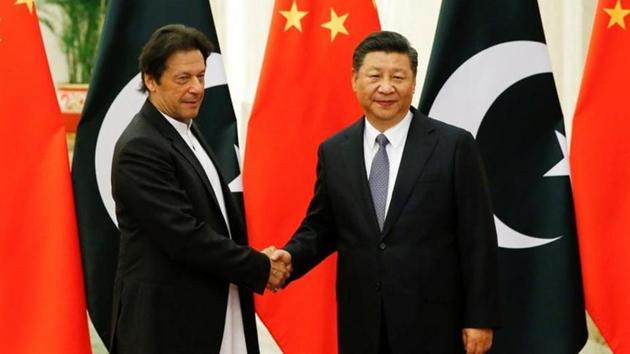Ahead of Xi Jinping’s India visit, Pak PM, army chief in Beijing
Khan reached Beijing early on Tuesday with an agenda packed with meetings and a speech at a business forum; to be finally wrapped up at the closing ceremony of an international horticulture exhibition on the outskirts of the capital.
Days ahead of President Xi Jinping’s high-profile visit to India, Pakistan Prime Minister, Imran Khan, and the country’s powerful army chief, General Qamar Javed Bajwa were in Beijing on Tuesday for a series of meetings with the top rung of the Chinese civil and military leadership.

Khan reached Beijing early on Tuesday with an agenda packed with meetings and a speech at a business forum; to be finally wrapped up at the closing ceremony of an international horticulture exhibition on the outskirts of the capital.
Beijing described it as a “working visit” by Khan who through Tuesday and Wednesday will meet President Xi, Premier Li Keqiang and Li Zhanshu, the chairperson of China’s legislature, the National People’s Congress.
Bajwa reached Beijing ahead of Khan and had a separate agenda of calling on the military leadership.
In a marked departure from usual protocol, Bajwa was with Khan when the latter met Premier Li on Tuesday evening; the army chief is expected to accompany Khan when he meets Xi on Wednesday as well.
The Pakistani army chief separately met Xu Qiliang, vice-chairman of the Central Military Commission (CMC), China’s top military organisation headed by Xi.
Xu told Bajawa that China was “…willing to keep advancing the ties between China and Pakistan and their militaries”.
“The friendship between the two countries has weathered the changing international landscape and stayed rock-solid,” Xu was quoted by official news agency, Xinhua as saying.
“China is willing to implement the important consensus reached by the leaders of the two countries, strengthen pragmatic cooperation with Pakistan in various fields and deal with risks and challenges together with Pakistan,” Xu said.
Bajwa told Xu that the Pakistani military is willing to “…strengthen strategic communication and pragmatic cooperation with the Chinese military, so as to make contributions to safeguarding regional peace and stability”.
Chinese officials didn’t say it on record but the evolving situation in Kashmir is likely to figure high-up in Khan’s talks with the leadership here; especially after Beijing’s apparent change of stand on Kashmir as the foreign ministry said on Tuesday that India and Pakistan should resolve the dispute through dialogue and consultation. There was no mention of any UN or UN Security Council resolutions by the ministry during the regular press conference on Tuesday.
Khan would also discuss the status and expansion of ongoing and future projects under the China-Pakistan Economic Corridor (CPEC), the flagship corridor under Xi’s Belt and Road Initiative.
Khan had said last week, as per Pakistani media reports, that the removal of all bottlenecks in CPEC projects and their timely completion was the top priority of the government.
“China attaches great importance to the visit of Prime Minister Imran Khan. He will meet with President Xi Jinping, Prime Minister Li Keqiang and Chairman Li Zhanshu will meet and have talks with Prime Minister Imran Khan and exchange views, and sign a cooperation document,” foreign ministry spokesperson, Geng Shuang said at the regular foreign ministry briefing on Tuesday.
“China and Pakistan are all-weather strategic cooperation partners. We have a good tradition of close exchange and communication. We have strategic mutual trust and advancing practical cooperation. Our cooperation in the China-Pakistan Economic Cooperation (CPEC) is bringing more outcomes to our peoples,” Geng added.
Khan is accompanied by a high-level delegation including foreign minister Shah Mehmood Qureshi, minister for planning, development and reform Khusro Bakhtiar, Board of Investment (BoI) Chairman Zubair Gilani and senior officials.
“It is important to note that COAS General Bajwa will be sitting at Khan’s meetings with Xi and Li. To my understanding, this is not a usual practice. At the domestic level, it shows that the military-political government is on the same page. With reference to China, it indicates that the security situation (in the region) is a really serious matter,” said Ghulam Ali, School of Marxism at the Sichuan University of Science and Technology.
On Kashmir, Ali said Khan might want to convey a message to India through Xi.
“Given the close nature of the (Sino-Pak) relationship and trust, there might be a direct message via Xi to Modi that the Indian government’s action (in Kashmir) has affected the region. However, to what degree Xi is ready to play the role, and most importantly, whether India agrees to listen and accept any advice is an entirely different thing,” Ali told HT.






